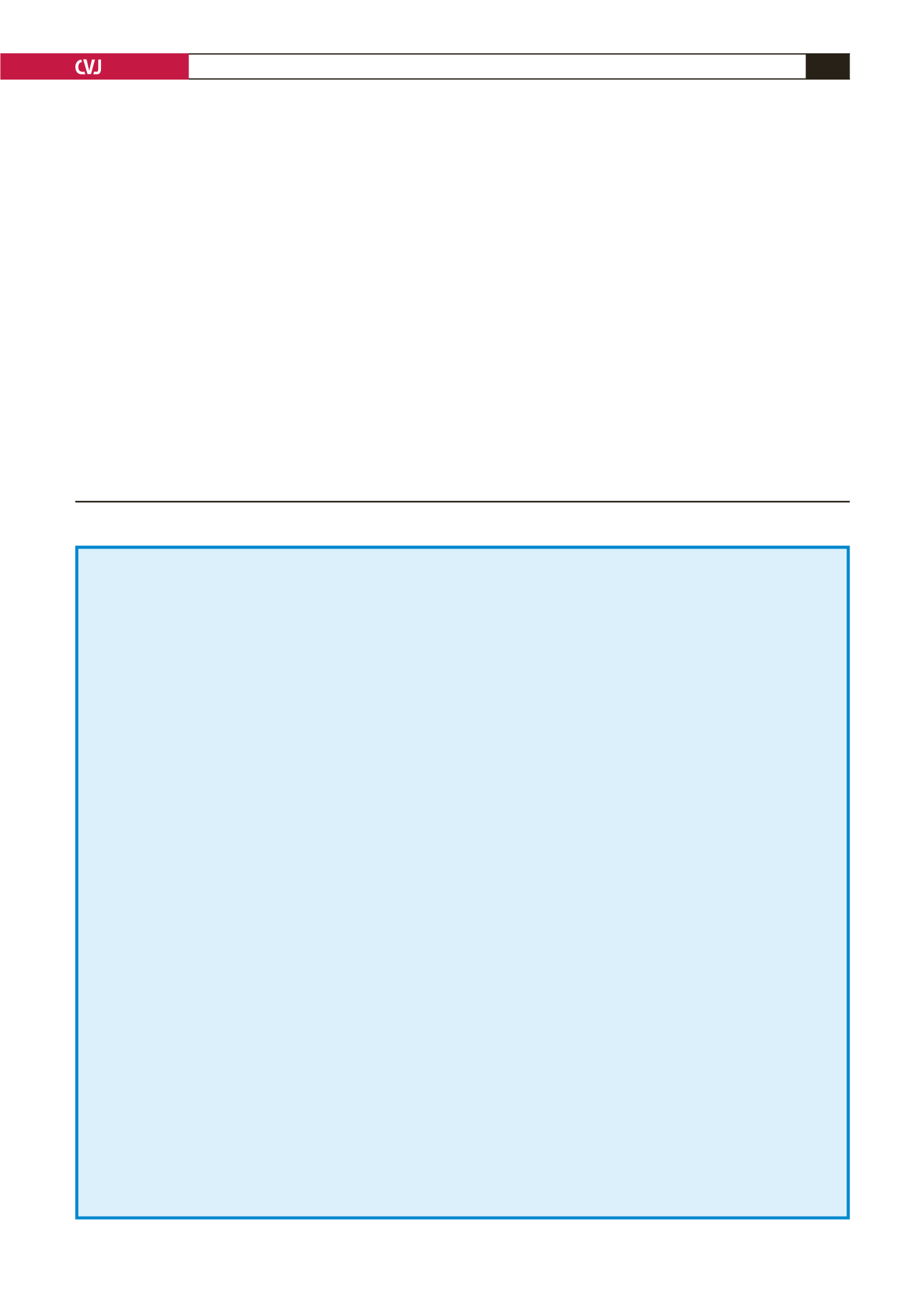

CARDIOVASCULAR JOURNAL OF AFRICA • Volume 30, No 1, January/February 2019
AFRICA
67
sion in Africa: Insights from the Pan-African Pulmonary Hypertension
Cohort (PAPUCO) Registry.
Int J Cardiol
2016;
221
: 205–211.
12. Beigel R, Cercek B, Luo H, Siegel RJ. Noninvasive evaluation of right
atrial pressure.
J Am Soc Echocardiogr
2013;
26
(9): 1033–1042.
13. Dzudie TAI. Predicting pulmonary hypertension and outcomes in
patients with left heart disease [Internet]. [cited 2016 May 17]. Available
from:
https://open.uct.ac.za/handle/11427/16533.14. Lanzarini L, Fontana A, Lucca E, Campana C, Klersy C. Non-invasive
estimation of both systolic and diastolic pulmonary artery pressure
from Doppler analysis of tricuspid regurgitant velocity spectrum in
patients with chronic heart failure.
Am Heart J
2002;
144
(6): 1087–1094.
15. Nagueh SF, Bhatt R, Vivo RP, Krim SR, Sarvari SI, Russell K,
et
al.
Echocardiographic evaluation of hemodynamics in patients with
decompensated systolic heart failure.
Circ Cardiovasc Imag
2011;
4
(3):
220–227.
16. McClanahan A, Guglin M. Right ventricular dysfunction compromises
accuracy of echocardiographic diagnosis of pulmonary hypertension in
heart failure.
J Card Fail
2011;
17
(12): 1023–1027.
17. McLaughlin VV, Archer SL, Badesch DB, Barst RJ, Farber HW,
Lindner JR,
et al
. ACCF/AHA 2009 expert consensus document
on pulmonary hypertension: a report of the American College of
Cardiology Foundation Task Force on Expert Consensus Documents
and the American Heart Association: developed in collaboration with
the American College of Chest Physicians, American Thoracic Society,
Inc., and the Pulmonary Hypertension Association.
Circulation
2009;
119
(16): 2250–2294.
18. Galie N, Humbert M, Vachiery JL, Gibbs S, Lang I, Torbicki A,
et al.
2015 ESC/ERS Guidelines for the diagnosis and treatment of pulmonary
hypertension: The Joint Task Force for the Diagnosis and Treatment
of Pulmonary Hypertension of the European Society of Cardiology
(ESC) and the European Respiratory Society (ERS): Endorsed by:
Association for European Paediatric and Congenital Cardiology
(AEPC), International Society for Heart and Lung Transplantation
(ISHLT).
Eur Respir J
2015;
46
(4): 903–975.
Many take other drugs that lower effectiveness of blood pressure medications
People who take pills to lower their blood pressure often take
other drugs that reduce the pills’ effectiveness, a large study
suggests.
Reuters Health
reports that researchers studied data
on 521 028 adults prescribed blood pressure pills for the first
time and 131 764 people taking at least four different pills to
lower their blood pressure.
Roughly 18% were also taking drugs that make blood
pressure pills less effective, the study found. These included
medicines like non-steroidal anti-inflammatory drugs
(NSAIDs), acetaminophen or hormones.
‘In some cases, use of these blood pressure-interfering
medications may be justified and the potential side effect
of elevations in blood pressure may be acceptable to
patients,’ said study leader Andrew Hwang of the High
Point University Fred Wilson School of Pharmacy in North
Carolina. ‘But in other cases… there may be significant
opportunities to switch to alternative treatments or reassess
the need for continuing the interfering treatment,’ Hwang
said. ‘If these drugs can be discontinued, it’s possible we can
reduce the prescribing cascade – that is, reduce the need for
using additional medication to treat a side effect of another
medication.’ Patients may not realise the risks, the report says
the findings suggest.
Among people recently prescribed blood pressure
medications for the first time, 58% later refilled prescriptions
for drugs known to increase blood pressure, the study found.
Among people prescribed four or more blood pressure drugs,
65% refilled drugs known to increase blood pressure after
stepping up their blood pressure treatment regimen.
Patients who need blood pressure medicine should ask
their doctor if any of the other medications they’re taking
might interfere, said Dr Gunnar Gislason, a professor of
cardiology at Copenhagen University Hospital Herlev and
Gentofte, and director of research at the Danish Heart
Foundation. ‘And if blood pressure drugs are not working,
it’s important to consider not just other drugs that might
influence blood pressure but also herbal medications that
often are considered harmless,’ Gislason, who wasn’t involved
in the study, said.
The way different drugs can increase blood pressure
varies, Hwang is quoted in the report as saying. ‘Some drugs,
such as NSAIDs and hormones, elevate blood pressure,
mainly by causing the body to retain excess fluid,’ Hwang
noted. ‘This effect counteracts the mechanism of some blood
pressure medications like diuretics (water pills), which cause
the body to get rid of fluid.’
‘Other drugs can cause blood pressure elevation by
constricting the blood vessels, increasing heart rate, or by a
combination of mechanisms,’ Hwang added. ‘There are also
some drugs, such as acetaminophen, that we know increase
blood pressure, but we don’t know how.’
The report says the study wasn’t designed to prove
whether or how certain prescription drugs might interfere
with the effectiveness of blood pressure medicines or increase
blood pressure. Another limitation is that it focused only
on patients who were taking prescribed medicines that can
interfere with blood pressure drugs, and many painkillers
such as acetaminophen and naproxen are available over the
counter without a prescription in the US, the study authors
note.
‘Although this study cannot tell us the reasons why the
prescription rate of blood pressure-interfering medication
is so frequent, it may explain why in (the) US population,
blood pressure control is still very poor,’ said Dr Liffert Vogt
of Amsterdam University Medical Centre. ‘Poorly controlled
blood pressure (is) a major cause of heart disease and stroke,’
Vogt, who wasn’t involved in the study, said by e-mail. ‘For
that reason, prescribing drugs that contribute to poor blood
pressure control should be carefully considered.’
Source:
Medical Brief 2018

















